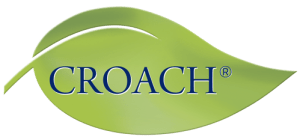Pacific Northwest Spider Control
Croach® provides licensed, experienced spider control services in Anacortes, Arlington, Auburn, Bellevue, Bellingham, Bonney Lake, Bothell, Buckley, Burlington, Camano Island, Coupeville, Eatonville, Everett, Federal Way, Ferndale, Issaquah, Kent, Kirkland, La Conner, Lake Cavanaugh, Lakewood, Lynden, Lynnwood, Marysville, Monroe, Mount Vernon, Mukilteo, Oak Harbor, Olympia, Oso, Puyallup, Redmond, Renton, Seattle, Sedro-Woolley, Snohomish, Stanwood, Sumner, and Tacoma.
Licensed, Bonded, Insured
WA Pest Control License #96366
WA Contractor Lic #PESTFF*894K4
How to Get Rid of Spiders in Seattle
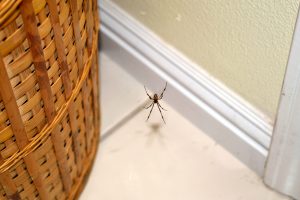 Spiders are probably not a welcome sight in your Seattle home. And where there are spiders, there are other unwanted bugs and insects that provide your spider invasion with a steady food supply.
Spiders are probably not a welcome sight in your Seattle home. And where there are spiders, there are other unwanted bugs and insects that provide your spider invasion with a steady food supply.
Spider infestation is never-ending. Because Seattle spiders will always find better, more habitable conditions inside your home than out in the wild.
However, Croach spider exterminator services, and steps for prevention you can take on your own, will help keep your home spider-free.
What spiders live in Seattle?
Black Widow
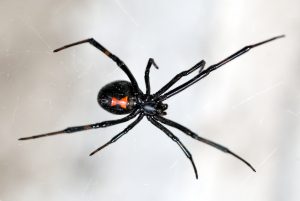 The black widow spider is recognizable by its dark color, black hair, and red hourglass pattern. The bright markings are a signal to predators not to eat them. Small predators, such as birds, often get sick after digesting a black widow and remember the unpleasantness.
The black widow spider is recognizable by its dark color, black hair, and red hourglass pattern. The bright markings are a signal to predators not to eat them. Small predators, such as birds, often get sick after digesting a black widow and remember the unpleasantness.
Females are true 'widows' because they eat their mate after mating. You'll find black widow spiders in webs behind furniture, in dark corners, and nested in crawl spaces.
The False Black Widow is also common near Seattle. It is all black but does not have the red markings. Though these spiders bite, the False Black Widow venom is far less toxic than a real Black Widow spider bite.
Giant House Spider
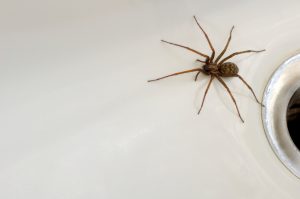 The sighting of a large and hairy Giant house spider in your home might be unsettling. But its bite is very rare, only mildly painful, and non-toxic to humans. Known for its speed (1.18 mph), it will usually skitter away when it feels threatened.
The sighting of a large and hairy Giant house spider in your home might be unsettling. But its bite is very rare, only mildly painful, and non-toxic to humans. Known for its speed (1.18 mph), it will usually skitter away when it feels threatened.
They are attracted to your home for shelter, mating, and food, preferring to eat fruit flies, moths, wasps, and other insects. Yet, females can survive for months without eating or drinking. Giant house spiders are not strong climbers and have poor vision.
You'll often find them under furniture, in a sink or bathtub, or in the garage.
Hobo Spider
 A hobo spider has an earthy brown coloring with a herringbone pattern across its abdomen. They prefer a dry, warm environment.
A hobo spider has an earthy brown coloring with a herringbone pattern across its abdomen. They prefer a dry, warm environment.
Hobo spiders can be aggressive toward humans when protecting their egg sacs or are accidentally disturbed. The webs of hobos are not sticky; thus, they must attack their prey to survive. But most of the time, they are shy and will try to escape human interaction.
Brown Recluse (who do not live in the Seattle area) and Giant House spiders are often confused with Hobo spiders due to their similar appearance. A hobo's legs are a solid tan or brown color. If you see a spider with alternating dark and light stripes on its legs, it is most likely not a hobo spider.
Yellow Sac
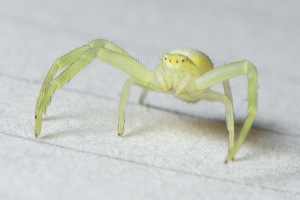 Yellow Sac spiders have eight similarly sized dark eyes arranged in two horizontal rows. They are excellent climbers due to the stiff black hairs covering long pairs of legs.
Yellow Sac spiders have eight similarly sized dark eyes arranged in two horizontal rows. They are excellent climbers due to the stiff black hairs covering long pairs of legs.
You'll find them climbing a wall, along window sills, behind wall hangings, and other vertical surfaces in your home. Yellow Sacs don't build webs. Instead, they construct silk tubes, or sacs, to shelter in by day. Hunting by night, they eat other insects, including larger spiders.
You risk a venomous Yellow Sac spider bite if it gets trapped between your skin and clothing, bedding, or furniture or it otherwise feels threatened.
Are there poisonous spiders in Seattle?
Actually, spiders aren't poisonous. They are venomous, and the venom is designed to kill their prey so they can eat. But, if you have the misfortune of getting bit by a spider, here are the types of spiders to watch out for.
The Black Widow is notorious for its neurotoxic venom (a toxin that acts specifically on nerve cells). A bite from a widow injects 15 times more venom potency than that of a rattlesnake but in a smaller dose. You may experience chest pain, cramping, nausea, difficulty breathing, sweating, and a host of other symptoms. Seek medical attention when bit by a black widow.
Yellow Sac spider bites are considered medically significant. Their venom has a toxic effect on human cells and is poisonous to nerve tissue. As painful as a wasp bite, you may feel a stinging and burning sensation for several hours. You may also experience blisters, a rash, cramping, nausea, and fever. Seek medical attention for yellow sac spider bites.
A Hobo spider bite is painful and was previously thought to cause tissue death, intense headaches, vision problems, and a generally unwell feeling. But recent research seems to show that Hobo spider bites are not harmful to humans; that a person has misidentified them when bitten. To be safe, try to capture the specimen that bit you and bring it with you when you seek medical attention.
When is spider season in Seattle?
There isn't a 'spider season' in the Pacific Northwest. They are always here, but at different stages of life. For instance, in the fall, spiders are on the move looking for mates. Most indoor spiders do not function well in cold conditions and lie low inside your home. Come spring, they may wander out of their hiding spots more often, seeking warmth and food.
Some species of spiders are growing in egg sacs over the winter, while others are growing from babies into adults. Some types of spiders prefer living in the garden, among vegetation, or in a stack of firewood, but make their way indoors as the evenings get cooler. Others live inside your home year-round, but as insect activity (their food source) increases in the summer, so do their public appearances.
How Do I Get Rid of Spiders in the Seattle Area?
You should avoid DIY pest control approaches in an attempt to exterminate spiders. Rather, seek professional help from Croach® spider control. Here are some prevention tips to help make your home less attractive to the Seattle spider population:
- Inspect the exterior of your home and seal up holes, gaps, and cracks.
- Vacuum regularly, particularly along the baseboard and trim, around door and window frames, behind and beneath furniture, and in corners at the floor and ceiling.
- Use natural deterrents next to your doorways and entrances such as lavender, peppermint, and citronella.
- Clear away clutter such as old furniture, boxes, or clothing store in areas like the crawl space, attic, or garage.
- Move beds away from the walls and remove bed skirts and items stored under the bed.
- Do away with the shrubs and bushy plants growing close to your home's doors and windows.
- Inspect items that are stored outside before you bring them indoors.
- Sweep webs away from the exterior of your home to include the foundation, eaves, doors, and windows.
Contact Croach Pest Control
Croach® spider exterminators are thorough and experienced. Your first visit includes a free inspection with customized recommendations. The initial treatment removes exterior webs and sacs, eliminates existing spiders, and includes interior service.
You'll have your first regular treatment thirty days later, which breaks egg cycles and eliminates remaining spiders. Regular treatments begin to apply the product and remove webs. It is frequency-dependent on the severity of your spider problem (i.e. Fall and Spring treatments lessen the risk of Yellow Sac spider infestation). We provide interior treatments and complimentary retreats between scheduled appointments upon request.
Allow us to get rid of the spiders invading your Seattle home today. Schedule a free inspection or call us at (855) 488-7378 for more information.
